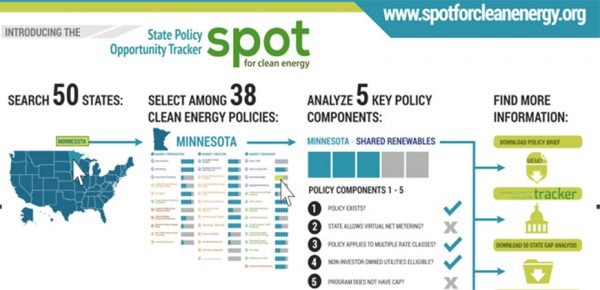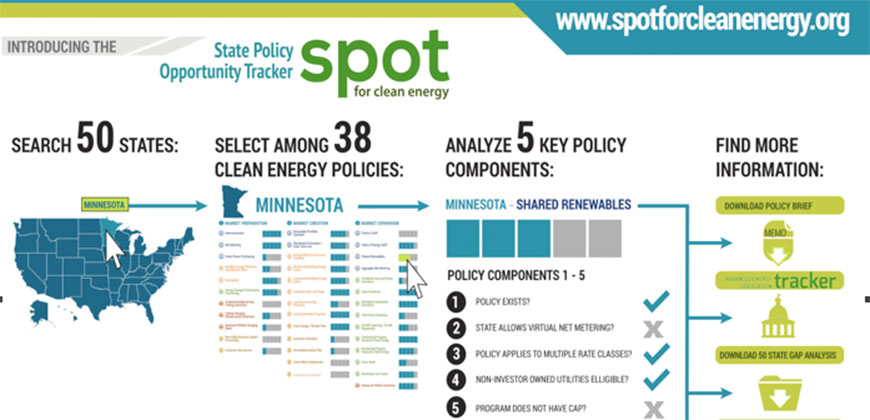For those wanting to understand clean energy policies on a state-by-state basis, SPOT is a new acronym which will prove to be very useful.
Colorado State University’s Center for the New Energy Economy and the Nature Conservancy have developed a state-by-state clean energy policy tracking site, called SPOT. The acronym stands for this important purpose: State Policy Opportunity Tracker (SPOT) for Clean Energy.

The SPOT for Clean Energy is a publicly available database that allows users to quickly review the status of 38 clean energy policies across all 50 states. It includes policies in the areas of renewable energy, energy efficiency, financing, infrastructure and transportation.
Benchmarking clean energy policies
The SPOT for Clean Energy benchmarks clean energy policies, enabling users to analyze both the status quo for a state and where there may be opportunities for future growth on clean energy. The database draws from data sources of 18 organizations, including the Department of Energy, the Database of State Incentives for Renewables and Efficiency (DSIRE), and the American Council for an Energy-Efficient Economy (ACEEE).
The site also provides analysis describing key components of each policy, as well as the origin of the data used in assessing state gaps. Information available on the site is free and is fully downloadable.
Bill Ritter Jr., former Colorado governor, is director of CSU’s Center for the New Energy Economy. As he points out, “When we look at where clean energy policy has advanced, overwhelmingly states have led the way. We believe that trend will continue. This site enables state policy makers to analyze their current state policies, and how they can go further, in a way that has not previously existed.”

Organizations behind the site
The Center for the New Energy Economy (CNEE), part of the CSU Energy Institute, is a privately funded initiative led by Ritter at CSU and is assisted by a team of energy and environmental policy experts. CNEE provides strategy and technical assistance to governor’s offices, legislators, regulators, utility companies and stakeholders that will facilitate America’s transition to a clean energy economy.
The Nature Conservancy, a conservation organization, works internationally to protect ecologically important lands and waters for nature and people. To date, the Conservancy and its more than one million members have been responsible for the protection of more than 119 million acres of land and thousands of rivers worldwide.
“The Nature Conservancy has programs in all 50 states, and has always believed that successful state and federal policy starts with good information,” said Lynn Scarlett, TNC’s managing director of public policy and former Deputy Secretary of the Interior. “Business and community leaders are eager to transition to a clean energy economy, and the information available through SPOT helps identify the policy gaps that must be filled to get us there.”
Images via CSU & SPOT

Website Designing Services and SEO Services